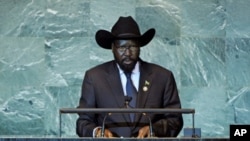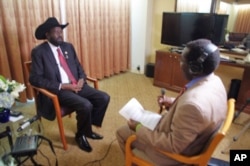In an interview at the United Nations on Saturday, South Sudan President Salva Kiir Mayardit said armed conflicts in the new nation are sponsored by ‘’enemies of South Sudan.’’
Mr. Kiir, who addressed the UN General Assembly in New York on Friday, told VOA various militias in South Sudan receive weapons from groups interested in seeing the country become a failed state. When pressed to identify exactly who is supplying weapons to the militias the president would only say, "...the people of South Sudan know" who they are.
There are approximatley seven armed groups engaged in armed conflict with the south's army, the Sudan People's Liberation Army.
President Kiir further said the reasons for the ongoing tribal clashes in parts of Jonglei, Unity and Upper Nile states are not deeply rooted in the fabric of South Sudan.
Abyei Invasion
He maintained that his government will solve the issues behind the insecurity caused by militia groups and cattle raids. Mr. Kiir assured the people of Abyei that the government is doing all it can to end the conflict in the disputed Abyei area.
"Abyei will be resolved between (the ruling party of Sudan) the National Congress Party and the Sudan Peoples Liberation Movement (SPLM) in South Sudan," he said.
In July 2008, the SPLM and the National Congress Party took the case of Abyei to the International Court of Arbitration in the Hague. The court issued its decision in July 2009, ruling that Abyei belongs to the nine chiefdoms of the Ngok Dinka, who are aligned with the south. President Kiir said that the May 2011 invasion of Abyei by Khartoum was "an attempt to lure" Juba into war and southern independence, which took place on July 9, 2011. Mr. Kiir added, "we knew the trick. We did not respond to their aggression.”
Abyei is an oil producing region claimed by both Sudan and South Sudan. President Kiir said the only reason for the dispute there is oil.
A referendum was scheduled for January 2011, at the same time southern Sudanese voted to break away from Sudan. The Abyei referendum did not take place, and it is unclear when or if it will be held.
Efforts of African Union
President Kiir praised the African Union's efforts to mediate between Juba and Khartoum as the two nations slide closer to war. Despite serious differences with the government of South Sudan and Sudan, Mr. Kiir promised to go to Kharoum to meet President Omar al Bashir to resolve the oustanding issues, including oil, border demarcation and citizenship.
Economic Prospects
President Kiir acknowledged South Sudan needs oil revenues to support the country's economy. He does, not, however, think the new government should become dependent on oil proceeds. “Our main source of economy is agriculture," he said. "What we should do is to use the oil money that we have today to re-fuel agriculture. And so agriculture will be the backbone of the economy of South Sudan. “
South Sudan is an extremely fertile nation with great agrcultural potential. Experts predict the new country can produce enough food to feed all of East Africa. The long civil war and continued presence in the region of the Lord’s Resistance Army in South Sudan has paralyzed food production in the region.






